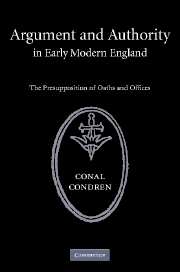Book contents
- Frontmatter
- Contents
- Preface
- Introduction
- Part I The liquid empire of office
- Part II The authority and insolence of office
- Part III ‘I, A. B.’
- 11 An overview of the oath in seventeenth-century argument
- 12 Coronation oaths
- 13 The oath of allegiance of 1606
- 14 Engagement with a free state
- 15 The oath of allegiance and the Revolution of 1688–9
- Epilogue
- Bibliography
- Index
12 - Coronation oaths
from Part III - ‘I, A. B.’
Published online by Cambridge University Press: 28 October 2009
- Frontmatter
- Contents
- Preface
- Introduction
- Part I The liquid empire of office
- Part II The authority and insolence of office
- Part III ‘I, A. B.’
- 11 An overview of the oath in seventeenth-century argument
- 12 Coronation oaths
- 13 The oath of allegiance of 1606
- 14 Engagement with a free state
- 15 The oath of allegiance and the Revolution of 1688–9
- Epilogue
- Bibliography
- Index
Summary
O, let thy vow
First made to heaven, first to heaven be performed…
(Shakespeare, King John 3.1)The five coronation oaths sworn during the seventeenth century were part of a remarkable semantic and ceremonial continuity dating from Anglo-Saxon times, when the hegemonic kings (bretwaldas) swore to uphold religion, peace and the folcricht, of those who gave fealty. For these duties the kings asserted their necessary prerogatives, cynerytha. William I's oath reassuringly echoed earlier ones, replacing folcricht with the custom of the English, consuetudo Angliae, but maintaining an expectation of reciprocal responsibilities. How far this formal translation of office qualified the disruption of conquest would become contentious; yet coronation oaths seem to have departed little from each other in the principles they enunciated; in some fashion all new monarchs swore to act justly, and maintain law, custom, religion and the office itself.
This continuity was made possible only because of the skiagraphic, or amphibolous open-endedness of the language used. It is symptomatic of the slipperiness of oath-taking that, despite appearances, the meaning of coronation oaths was debatable whenever a monarch was in trouble. The contrast with France is striking. There too, the king swore an oath at his coronation but the hereditary principle was dramatically more secure and the meaning of the oath symptomatically more straightforward. Between the accession of Hugh Capet (987) and 1789, no king was deposed and none assumed the throne devoid of accepted right.
- Type
- Chapter
- Information
- Argument and Authority in Early Modern EnglandThe Presupposition of Oaths and Offices, pp. 254 - 268Publisher: Cambridge University PressPrint publication year: 2006

